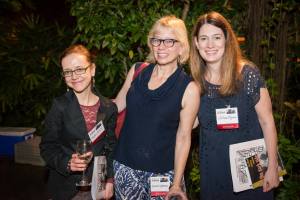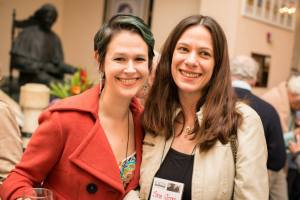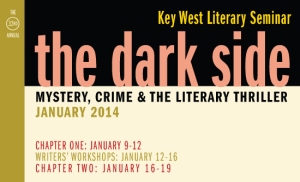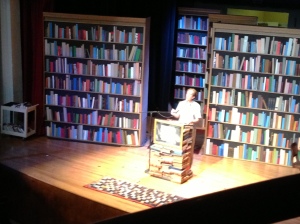 I was confident the Literary Seminar was going to be great. First of all, it always is and second, with this line-up, how could it not be? Carl Hiaasen brought down the house Friday night, just as you'd expect. Joyce Carol Oates was eerily mesmerizing, like she always is. Still, it's the unexpected that brings me the most pleasure. And though I hoped (see previous post, below) that the women were going to be my favorite parts of the event, they managed to eclipse my expectations.
I was confident the Literary Seminar was going to be great. First of all, it always is and second, with this line-up, how could it not be? Carl Hiaasen brought down the house Friday night, just as you'd expect. Joyce Carol Oates was eerily mesmerizing, like she always is. Still, it's the unexpected that brings me the most pleasure. And though I hoped (see previous post, below) that the women were going to be my favorite parts of the event, they managed to eclipse my expectations.
The highlight was a Sunday morning panel titled "Fatal Vision: The Imprint of True-Crime Movies." The panel consisted of Megan Abbott, Laura Lippman and Gillian Flynn. They set out by telling us that the panel's title had been classed up and what they were going to talk about was their unironic love for Lifetime movies. And then they did. It's already on the Seminar's Audio Archives page and it's worth the listen even if you've never seen or wanted to see a Lifetime movie in your life. Laura Lippman has already written a great essay expanding on the panel's central theme -- the lack of meaty roles for middle-aged women in Hollywood and how the true crime genre, frequently derided as trashy, allows women to express their full dark sides. Clearly it speaks to great numbers of people -- mostly but not all women -- and it goes beyond the camp value of seeing Meredith Baxter or Farrah Fawcett enter a homicidal fugue state. Several female friends and I agreed immediately after this panel that we need to have a Netflix movie viewing binge weekend. I also think Lifetime should consider hiring these three to host a show about the genre.
Gender was on my mind a lot through the weekend -- and not in a preachy, academic kind of way. Perhaps because we started off with a keynote from Sara Paretsky, a pioneer of kickass female P.I. fiction. Cara Canella wrote a nice piece about it for Littoral and the address itself is on the Audio Archives page. And BTW, keep an eye on Littoral in general for great Seminar coverage, words and pictures, throughout. Many people were kind enough to say nice things about my program intro Friday morning and it's also excerpted on Littoral.
The other great revelation to me during this Seminar was not a younger woman at all, but an older gentleman -- Alexander McCall Smith. He's easily dismissed as a writer of gentle cozies. He is, in person, hysterically funny and one of the Seminar highlights was when he would crack himself up reading his own work. Hopefully the audio will appear soon; when it does I'll post it here.
I was tweeting a lot during the Seminar (I'm @keywestnan; the Seminar itself is @keywestliterary) and so were a few other people, mostly under the hashtag #kwls. If you're Twitter-averse, here are some of the Chapter One highlights in snippets I managed to jot down:
Sara Paretsky:
"In any situation, I anticipate the worst outcome, which by no means prepares me for the worst when it actually arrives."
"Every writer's difficult journey is a movement from silence to speech."
In crime fiction she read as a young person, the most defiant of female stereotypes, "in a cheerful Jell-O eating way, was Nancy Drew."
"I write, I chronicle, but I retreat from personal confrontation. People ask if [V.I.] is my alter ego. She is not. She is my voice."
Paretsky aspires to write like Charles Dickens and Elizabeth Gaskell -- storytellers who used social issues as backdrops and used their fiction to tell essential truths about our emotional lives, "what we fear, what we want, what we need."
Joyce Carol Oates:
"It's a rare homicide that destroys only one person."
Scott Turow:
"What people really want to know desperately is why it happened, why a crime occurred."
"Recognizing that crime was a subterranean passion changed my life."
Gillian Flynn:
She is often asked "Does Gillian Flynn hate women? No. I think that's a misogynistic question, actually."
On whether she'll write a sequel to Gone Girl: "I think it's very important for me to get away from Nick and Amy for a little bit. It might be interesting to visit them in 10 years or so and see how they're doing. Not well, I assume."
John Katzenbach:
"My books are about people who are caught up in great moral and ethical quandaries, which they solve with a volley of gunfire."
"What ordinary people can think up to do to each other is far worse than anything I can come up with in my worst mood."
Journalism is "a wonderful way to channel yourself into becoming a writer, because you learn so much so damned quickly."
Laura Lippman:
"Fiction is a better vehicle for truth than journalism."
Journalism is good training for writing because it makes you a professional. "You meet deadlines. You don't take yourself too seriously. You get up, you write. It's a job."
"I have limitations. I don't think the genre does."
"I'm really happy to be in a genre where people read."
"Things that make men cry are considered profound. Things that make women cry are considered sentimental. … You wouldn't have to have a panel defending the gangster film."
Joseph Kanon:
On a favorable review of his first book, which praised him by saying has had "enough talent to write a serious novel" : "I did write a serious novel. It just happened to have a body on the first page."
After being criticized by a reader for his description of a gun: "From now on, I'm just pushing people out of windows. … The only interesting thing is why they did it, not how."
Stephen L. Carter:
"There's a big downside to writing historical fiction. The big downside is running into people who know the history better than you do after you've written the book."
William Gibson:
"Neuromancer is just a caper plot. … I personally think it doesn't quite make sense … which one finds out when one tries to write a screenplay of it."
Of the book he's currently writing: "I still don't know who did it. I'm really close to the end of the book and I'm going to have to decide who did it."
"The Wire may be as close as anything we have to Dickens today."
"I've continued to resort to mostly MacGuffin plots … the simplest little Rube Goldberg plot mechanisms but they seem to get me through to the end and they don't get in the way of doing all the wacky stuff I really love to do."
Billy Collins:
"I don't do dark very well. I don't do crime. But I can do creepy and I can do freaky."
"I tell my students if you're majoring in English, you're majoring in death. It's all about the mortality."
Attica Locke:
"America is a great freedom experiment that has to keep testing its results."
Carl Hiaasen:
Key West's own convicted drug dealer turned fugitive fire chief Bum Farto is "a character no novelist could have plausibly created."
"In my books, the alligator usually wins."
On discarding sections of writing: "You don't want to throw away anything good in case you never come up with anything good again."
"Not thinking you're good enough is the only thing that makes you better."
On writing sex scenes: "You don't want to go someplace your significant other has never been."
"Every writer's office sort of becomes a tomb for awhile."
"The job of any writer is to entertain. That's what we're paid to do."
Alexander McCall Smith:
"It's very important to get your first line right because it's the only line many people read."
Jonathan Santlofer:
"There are just as many good and bad literary novels as there are good and bad crime novels."
At Yaddo, copies of books by Dennis Lehane and Lee Child were circulating among resident artists … in a brown paper bag. "It was as if people were delivering drugs to people's rooms."
Les Standiford:
"The Great Gatsby is structured as a detective novel. … In its form, in its structure, it's a suspense thriller."
Regarding literary short stories by writing students: "Nothing ever had to happen and nothing usually did."
"The only place that very many people read books they are not interested in is college."
James W. Hall:
All fiction starts with some sort of crime: "The normal social order, the equipoise of the world, has to be knocked out of balance."
Plot is what distinguishes crime novel from literary fiction, "a coherent, causally connected series of events. … People respond to that."
On the mid-century change from the novel as popular entertainment to highbrow art form: "They injected this sense of guilt, that you had to have an education to really appreciate what the novel was about."
Arthur Conan Doyle is the father of British detective fiction, but Edgar Allan Poe is the father of American crime fiction, which includes horror along with ratiocination. So a British Agatha Christie-like mystery starts with "an embarrassment on the rug" while an American crime novel starts with "a horror on the rug."
Megan Abbott:
On discomfort with the darker side of teen girls, ie. desire, hunger, aggression, jealousy: "Teen girls are supposed to be the objects of desire. They're supposed to be looked at. They're not supposed to desire."
"What is a more noir terrain than high school? When you're in it, there is nothing more powerful or more monstrous."
"I would not want to be a teenager today. I didn't want to be one then."
"It's a time when you're most curious about the world -- and most poised to have your illusions shattered."
"You bluff your way into situations you can't handle -- and the consequences can be dark and dire."
On the intensity of female adolescent friendships, even after you move on to adulthood: "It remains this invisible tattoo on you."
"Girls have always wanted to read icky things and probably always will … Dark young adult books did not start with The Hunger Games."
Recommended Reading:
D.R. MacDonald (recommended by Scott Turow)
Iain Sinclair (recommended by William Gibson, who said Sinclair is considered part of the London Project and sometimes described as "Peter Ackroyd on acid.")
Ned Bauman, specifically The Teleportation Accident (Gibson again, who described it as "the craziest thing I've read in 20 years.")
Gary Shteyngart (recommended by both Carl Hiaasen and Gillian Flynn)
Ian Frazier, specifically Coyote vs. Acme (Hiaasen)
Flattened Fauna, a book of photographs of roadkill (Hiaasen)
P.G. Wodehouse, Mark Twain (recommended by Flynn for the funny)
Rose MacCauley, The Towers of Trebizond (recommended by Alexander McCall Smith and I honestly could not tell if this was a tongue-in-cheek recommendation or not -- but after reading a little more about it I'm inclined to think it was sincere and the book is worth checking out.
Lois Duncan, Daughters of Eve (recommended by Megan Abbott)
Until the Twelfth of Never: The Deadly Divorce of Dan and Betty Broderick (recommended by Laura Lippman, Megan Abbott and Gillian Flynn)
Evidence of Love by John Bloom (Lippman/Abbott/Flynn again -- another true crime book that was the basis for a Lifetime movie)
Very Much A Lady by Shana Alexander (this is the Jean Harris/Herman Tarnower story, specifically recommended by Abbott)
Fun Facts:
To unwind after a long day of writing dark material, Gillian Flynn plays video games for 10 minutes or so -- or else watches YouTube snippets from cheery musicals like "Singin' in the Rain." She also has a plaque on her desk that says "Leave the Crazy Downstairs." Carl Hiaasen, meanwhile, has a doormat outside his office that says "LEAVE."
Attica Locke's husband was delivered by Scott Turow's father (who was a Chicago ob/gyn)




